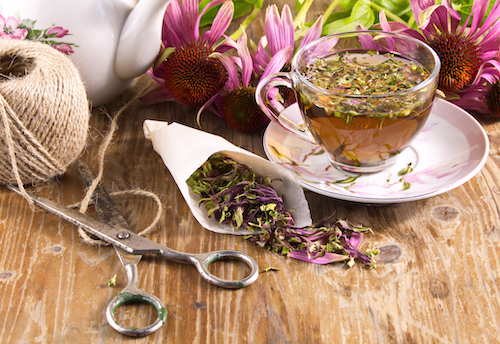
When it comes to boosting your immune system, Echinacea and Thyme are two brilliant herbs that go a long way. I love recommending them to my patients, as well as family and friends, as they never let me down. As with most of the herbs I support, they have been used since ancient times but are also well researched, making them powerful medicinal tools for modern times.
Echinacea
Echinacea, also known as purple coneflower, is the prime remedy when it comes to help your body fighting both bacterial and viral infections, being my first choice to boost the immune system in case of the common cold or the flu. There are several species of this plant but Echinacea angustifolia and Echinacea purpurea are the species most commonly used. The main active constituents of Echinacea are alkylamides, caffeic acid derivatives and polysaccharides, responsible for its anti-microbial, anti-viral and anti-inflammatory properties. In vivo and in vitro research has shown that Echinacea extracts can activate immune cells called macrophages as well as modulate expression of inflammatory molecules called cytokines.
Best way to take Echinacea
The best way to take Echinacea is in the form of tincture (an alcoholic liquid extract) or tablets. Commercial preparations of Echinacea can vary greatly in their quality and concentration therefore I always advise to be well informed before buying if you would like to get the best benefits.
My top tips to identify a good quality Echinacea preparation are:
- Look for options containing either the roots only or the whole plant (whole plant is a mixture of the roots and the aerial parts of the plant), and avoid preparations made only with the aerial parts also referred to as herb or herba
- If buying a tincture, look for the characteristic tingling sensation on the tongue, a sign of high content of alkylamides, one of its main active ingredients
Echinacea should be taken at the first signs of a cold or the flu, and can also be taken preventively during the cold season. Be aware that the prolonged use of Echinacea is not recommended. The World Health Organization has suggested that short-term use of Echinacea is associated with a good safety profile. There are however a few situations to be taken into consideration. As Echinacea modulates the immune system, it is contraindicated in transplant patients taking immunosuppressant medication and patients with auto-immune diseases. Also, patients with known allergy to plants of the Asteraceae family (also known as the daisy family) should not take Echinacea.
As with most herbal remedies, if you would like to know more about Echinacea and how to take it, it is best to seek advice from a qualified herbalist – book your appointment here.
Thyme
Thyme (Thymus vulgaris), the common Mediterranean aromatic herb that you can find in your garden, has been widely used in the kitchen but also as a remedy for several ailments. It is known for its strong anti-bacterial and anti-microbial properties due to the presence of the volatile oils thymol and carvacrol, which are also responsible for the beautiful aroma we all know. Other constituents with antioxidant and anti-microbial properties include substances called flavonoids. Thyme is a great aid in fighting infections particularly those of the respiratory tract system such as bronchitis and tonsillitis. So, if your cold or flu is giving you that troublesome sore throat or irritable cough, why not combine Thyme with Echinacea for a powerful mix?
Best way to take Thyme
Thyme can be taken as a tincture but you can also turn to your garden and reach for a bunch of fresh Thyme for a soothing tea. Best results are achieved by infusing fresh thyme leaves (or dry leaves) in boiling water for 15-20 minutes, and drinking 2 to 3 times a day. What I mostly like about Thyme is that it is such an effective herb and at the same time so easy to find and use. Thyme also comes with the extra benefits of supporting digestion and reducing bloating, as well as providing you with important minerals (not something we would think of) such as iron and Vitamin K.
I hope you feel now ready and positive to enjoy the cold season to come!



